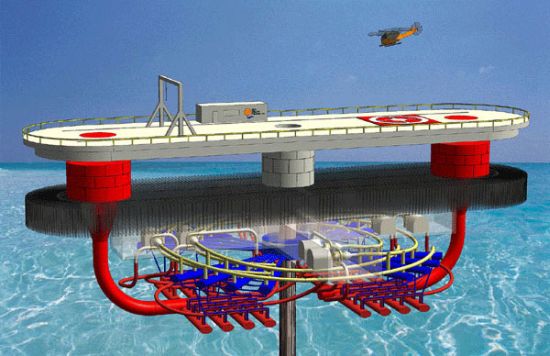
In the quest for developing alternate recyclable energy sources, perhaps the greatest potential lies in the development of commercially viable energy from the abundant sunshine our planet receives each day. The popular method of harvesting solar power lies with direct collection of the sun’s energy on huge solar-energy collectors. More than a hundred years ago, a French physicist Jacques Arsene d’Arsonoval proposed generating electricity from the ocean. The Ocean Thermal Energy Conversion (OTEC) technology is the method of running heat generators by using the temperature difference between the upper and lower levels of the sea to produce electricity
The first OTEC plant was built in Cuba in 1930 that was capable of producing 22KW of electricity using a low-pressure turbine. After being relegated to the backstage of solar energy development programs for ages, OTEC has once again sprung back to life owing to the efforts of a team of British architects. The scientists hope to build a network of floating platforms that in addition to being equipped with OTEC power generators will also have wind and wave turbines. A single platform will be capable of producing 250MW of energy. In addition to producing green energy, the unique conversion process will be capable of producing desalinated water as a byproduct and hydrogen fuel that is touted as the next generation fuel to run cars, mobile phones and a large number of other electrical gadgets.
For OTEC to become commercially viable, the projects must receive favorable tax treatments and subsidies to become economically competitive with other power sources that are currently subsidized. Another major concern of setting up OTEC facilities is political in nature. The exact location and legal status of the OTEC platforms that are in the nature of artificial islands may be affected and there may be ownership conflicts over the platforms by the UN Convention on the Law of the Sea treaty that grants coastal nations 3-miles, 12-miles and 200-miles zones of legal authority from land. The future of the OTEC plants might also be adversely affected by interests of the fisheries groups and future seabed mining operations.
Via: tfot




